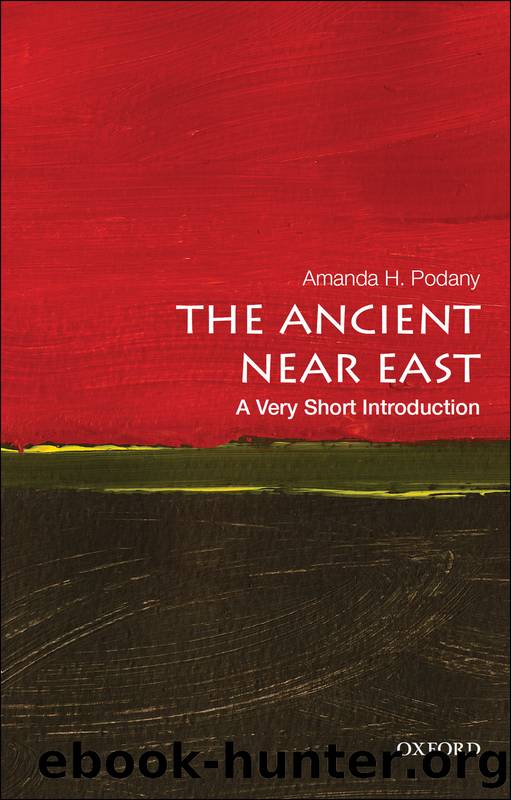The Ancient Near East by Amanda H. Podany

Author:Amanda H. Podany [Podany, Amanda H.]
Language: eng
Format: mobi
Publisher: Oxford University Press, USA
Published: 2014-12-26T18:30:00+00:00
7. In this cuneiform letter found in Kanesh, the Assyrian merchant Assur-idi writes to his son Assur-nada about their trading operations transporting textiles to Anatolia.
The father and son kept separate accounts, as is clear from Assur-idiâs insistence that Assur-nada not spend what he called âmy silver,â but they worked very closely together. The closeness is surprising, though, given that each of these letters would have taken about six weeks to arrive at its destination and the answer would not have come back for at least three months.
Assur-nadaâs other two brothers also worked in the family business. A younger brother did a great deal of the traveling, including sometimes returning to their father in Assur. Sadly, this brother died young of an illness. Assur-nadaâs letters show that, like his brother, he also traveled around to other cities in Anatolia, looking for places to sell his tin and textiles. On occasion he might even have returned to Assur (at least, his father pleaded for him to do so), but mostly he employed other traders to travel back home.
When the family patriarch, Assur-idi, wrote his letter to Assur-nada, he was not only angry about business. He also had a personal crisis on his hands. He continued:
I raised your son, but he said: âYou are not my father,â whereupon he left; I also raised your daughters, but they said: âYou are not our father.â On the third day they left and departed for you and now I want to know what you have to tell me.
When Assur-nada had gone to live in Kanesh, he had left his son and daughters at home in Assur to be raised by their grandparents since their mother was dead. But now the children (who were presumably grown) had left for Anatolia as well, to be with their father. They had even said to their grandfather Assur-idi âYou are not our father!â This was a particularly powerful statement in Mesopotamia, one with legal implications. A husband divorcing his wife had to speak the words âYou are not my wife!â and a father renouncing his adopted son had to say âYou are not my son!â Assur-nadaâs children were formally breaking their ties with their grandfather to rejoin their father and his new Anatolian wife in Kanesh. We know from other letters that as an adult, Assur-nadaâs son took up residence in a different city in Anatolia, working as a merchant, but that, like his uncle and so many others in the ancient world, he died young.
It is telling (and typical of the Assyrian merchants) that in the letter Assur-idi wrote about business matters first, mentioning the family crisis almost as an afterthought. His grandchildren renouncing him and leaving for Anatolia must have had a bigger impact on Assur-idiâs life than the need for this particular payment of silver, but business came first.
Mesopotamian letters were rarely affectionate. In fact, they often sound curt. This might have been because they used no equivalents for âpleaseâ or âthank youâ in regular conversation. But what sounds to us like rudeness would have seemed quite normal to Mesopotamian ears.
Download
This site does not store any files on its server. We only index and link to content provided by other sites. Please contact the content providers to delete copyright contents if any and email us, we'll remove relevant links or contents immediately.
| Africa | Americas |
| Arctic & Antarctica | Asia |
| Australia & Oceania | Europe |
| Middle East | Russia |
| United States | World |
| Ancient Civilizations | Military |
| Historical Study & Educational Resources |
The Daily Stoic by Holiday Ryan & Hanselman Stephen(2701)
The Fate of Rome: Climate, Disease, and the End of an Empire (The Princeton History of the Ancient World) by Kyle Harper(2428)
People of the Earth: An Introduction to World Prehistory by Dr. Brian Fagan & Nadia Durrani(2343)
Ancient Worlds by Michael Scott(2097)
Babylon's Ark by Lawrence Anthony(2064)
Foreign Devils on the Silk Road: The Search for the Lost Treasures of Central Asia by Peter Hopkirk(2048)
India's Ancient Past by R.S. Sharma(1982)
MOSES THE EGYPTIAN by Jan Assmann(1967)
The Complete Dead Sea Scrolls in English (7th Edition) (Penguin Classics) by Geza Vermes(1834)
Lost Technologies of Ancient Egypt by Christopher Dunn(1795)
The Daily Stoic by Ryan Holiday & Stephen Hanselman(1764)
The Earth Chronicles Handbook by Zecharia Sitchin(1741)
24 Hours in Ancient Rome by Philip Matyszak(1673)
Alexander the Great by Philip Freeman(1642)
Aztec by Gary Jennings(1538)
The Nine Waves of Creation by Carl Johan Calleman(1517)
Curse Tablets and Binding Spells from the Ancient World by Gager John G.;(1508)
Before Atlantis by Frank Joseph(1481)
Earthmare: The Lost Book of Wars by Cergat(1464)
